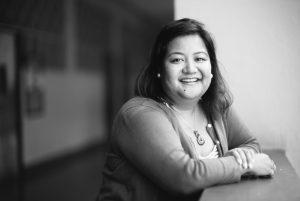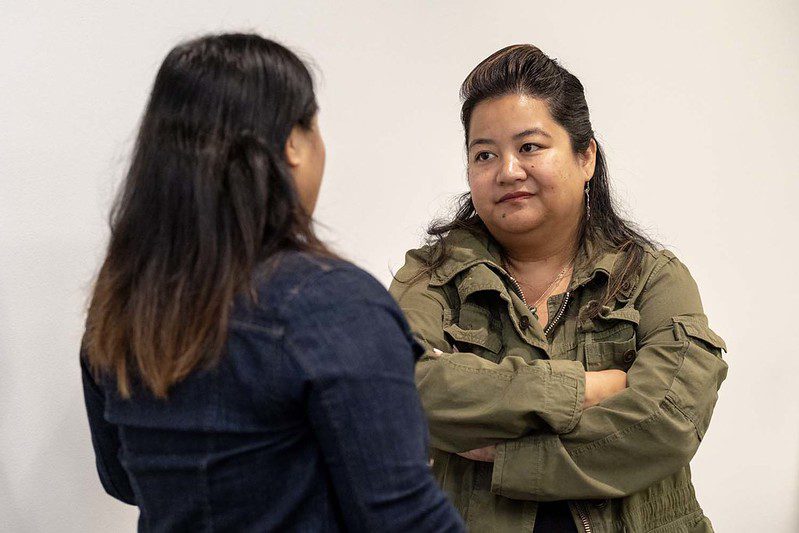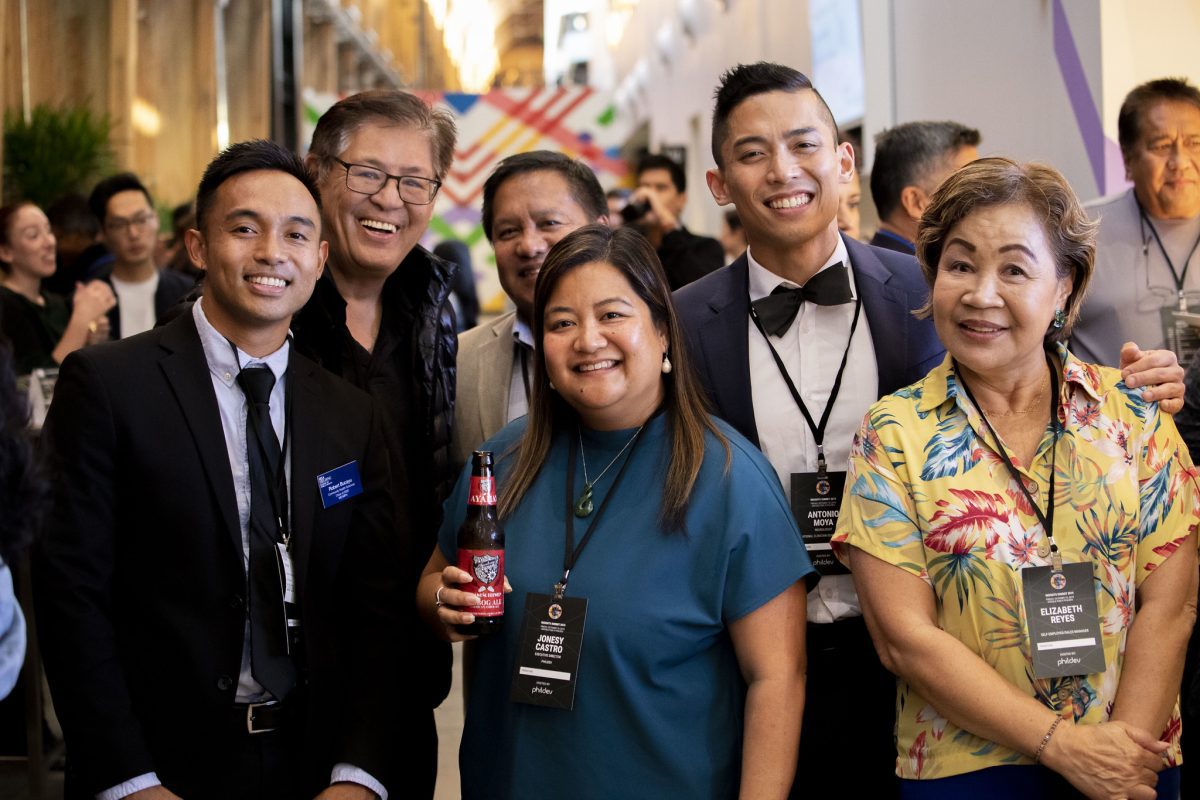by Adriel Nisperos
“I’ve always wanted to work for a company where I really feel like I’m making an impact. And to do that for my country and to Filipinos, it took a step further and made it even more meaningful for me.”
 You never really know where life would take you. One day you’re doing something. The next thing you know, you’re off to your next adventure.
You never really know where life would take you. One day you’re doing something. The next thing you know, you’re off to your next adventure.
Angelina Castro (or Jonesy as we call her at PhilDev) took many turns in her career journey. But one thing’s certain for her. She wanted to make a difference in the world.
In my brief chat with Jonesy, she shared what it’s like to be PhilDev’s Executive Director, managing the team from 8,000 miles away, and turning the organization’s mission into reality in the midst of a pandemic.
Can you briefly share your experience and how this led you to PhilDev?
Jonesy: It’s a very winding path. I went to college for Architecture. I graduated from University of California Berkeley with a degree in Architecture from the College of Environmental Design. After graduating, I tried it [architecture]. I worked for three months at a firm. But later on, I found that the profession wasn’t for me.
I tried a lot of different things. I worked in the marketing department of a publishing company here in the US. I was creating covers for college textbooks.
I’ve been very lucky to have a network of people who, when the time was right, asked me if I would like to try something. I pretty much took every opportunity that was offered to me, so I moved from the publishing company to helping my parents manage a franchise they put up. After that, I moved to a consulting company for biotechnology and stayed there for 7 years doing marketing, and then eventually heading their global recruitment team.
I started volunteering for PhilDev while working in that company. I volunteered for their annual gala in San Jose, California in 2013. A year later, I continued volunteering for PhilDev for their benefit concert where Lea Salonga performed. It was really during this time when I got to know more about PhilDev and its mission. That was also the time that I asked if I could work for PhilDev on a more regular basis.
Fast forward to now, I’m still working at PhilDev even after 8 years. Time flew by, but I wouldn’t have stayed this long if I didn’t believe in what we’re doing as an organization for the community and for the Philippines.
What made you decide to go into the nonprofit sector?
Jonesy: I think mostly it’s because of the cause and the people. I think that I’ve always wanted to work for a company where I really feel like I’m making an impact. And to do that for my country and to Filipinos, it took a step further and made it even more meaningful for me.
Getting to know all the people who have joined PhilDev and who are also passionate about helping the Philippines, from the trustees all the way to the volunteers, has been great. It’s just nice that even though it’s not a flashy nor a lucrative space to be in, at the end of the day, I’m proud of the work that we’re doing, and I like the people that I work with. That’s what kept me going for so long.
What’s the best part of working at PhilDev?
Jonesy: For me, it’s the people. I really like our team. It hasn’t been over two years, but I love going to the Philippines and working with you all, and seeing our programs happening. I mean we’re doing it virtually now, but for me there’s a different energy and vibe when we do it in person. So it’s the team putting the programs into place; but it’s also seeing the ideas and programs we’ve either applied for or worked really hard to propose come to reality. It’s seeing those activities that take so much planning and work, and the impact that we’re making on students, universities, and startups.
When we get those comments thanking PhilDev for what we’re teaching or offering, it makes everything all worth it. I mean I could have the worst day and then somebody just says, “Thank you. Without PhilDev, I wouldn’t be able to go to school,” or to see our professors who studied here in the US for the benchmarking program and then go back to the Philippines to teach their own students – it’s really fulfilling and gratifying. You can’t put a price on that.
Being the Executive Director of PhilDev, how do you think your work contributes to achieving the organization’s goals?
Jonesy: Probably up until the lockdown or the pandemic, I would say that the PhilDev US was mostly responsible for fundraising to support our programs. Without the donations and contributions from our supporters, then none of our programs would be able to happen. So I think that’s the impact of what we were doing at least from a logistical standpoint.
But in the last two and a half years with the pandemic, I think it really changed in the sense that since everything went virtual, I got to be more involved with the program and management. I was also able to participate in the activities since everything was virtual versus having to fly over for different events, and I could only join some and help in, let’s say, the planning.
In the last year or so, I got more involved in overseeing both the PhilDev US and Philippine teams. It’s just nicer that I get to engage and be able to contribute to the planning up to the execution of PhilDev’s overall strategy.
Working with PhilDev in the last 8 years, what insights have you learned about the Philippines’ education system?
I grew up and studied in the US. But from what I’ve seen, at least in the tertiary level, I think in the last 8 to 10 years, there has been a huge improvement for sure in the school system. I think that our programs at PhilDev through the benchmarking program and study visits have been helpful and instrumental in making Philippine courses more engaging and interactive.
I think definitely in the last few years, we’ve seen that mentality come into the Philippine school system more. But overall, I think it’s still relatively traditional. I think there should be more flexibility at schools to try different electives and not have students take a test and dictate the courses they should take.
At UC Berkeley at that time, to be a full-time student, the minimum number of units you have to take is 12. Taking 15 to 16 units was the normal thing to do. Then if you’re reaching 20, you’re way oversubscribed. So to hear students in the Philippines taking 20 to 24 units, it’s no wonder they don’t have time to explore other opportunities or other areas of study. It makes it difficult for them to have an interdisciplinary exchange with other students. I think one of PhilDev’s biggest discussion points is inclusivity. You can’t have all the engineers study only engineering. I think they can solve bigger problems when they have an exchange with like psychology majors or health students, and see areas that need help or innovations for.
Overall, I think there were improvements, but there’s still room for more improvements.
What are your insights about the country’s innovation and entrepreneurship ecosystems?
Jonesy: I think in contrast to the school system, it has made a lot more improvement in the last decade. I think we’ve seen a huge amount of growth in the startup ecosystem in the Philippines. When I started at PhilDev, there really weren’t many incubators or accelerators at that time at all. Maybe two or three. Now, I would see that a lot of universities have their own incubators; there are new organizations that set up offices across the country or started their own programs.
If we’re talking about the level of the startups, I think there has been a huge improvement as well just seeing through the startups that participated in our various programs. In the US, as startups develop whatever their ideas, products, and services, they are already thinking about scaling globally. Whereas in the Philippines, I think that mindset has yet to develop.
Still, the ecosystem today is a lot better. I think the government has also implemented laws like the Philippine Innovation Act and the Innovative Startup Act which are all helping. Just seeing the government and private sector working better together, I think they’ve recognized that their role can make a big impact in the creation of startups in the Philippines. So that’s a huge step, but we need to keep pushing.
How do you envision the Philippines 10 years from now?
Jonesy: Oh man, I want so much for the Philippines just because I know that we are smart, hardworking, creative, and resilient people.
Overall, I want to see people lifted out of poverty. I want to see a number of unicorn startups coming out of the country. Because when we build companies, they’re giving more people access to employment. And as we say at PhilDev, which I truly believe, these companies also redistribute wealth. That’s our belief, our mission, and I hundred percent believe and back that.
Ten years go by fast, but at the same time a lot can be done in 10 years. Like in less than a year, nobody was talking about NFTs or like people are still skeptical about cryptocurrencies. But now people are like, “So how can I create NFTs?” I think that part happened really fast.
What does success for PhilDev mean for you?
Jonesy: When it comes to fundraisers, my dream would be to get Bruno Mars, JoKoy, or H.E.R. perform at our next gala. If I can get one of these people, I would probably do a mic drop moment.
I’d love to see PhilDev having its own incubator or workspace. I envision a huge office full of startups and activities – kind of like having everything that entrepreneurs would need to develop their products or solutions. That would be amazing to have for PhilDev – a space where everybody can just collaborate and bounce ideas off each other.
I’d love to see more scholars in the program. The more scholars PhilDev can support, the better. Growing up, I was taught that when you give someone an education, it’s something that nobody can take away. Education is yours forever.
In general, I want to see PhilDev creating as much opportunity as possible for people to succeed. It’s Dado’s legacy. That’s what he wanted to see. He came out of the school system, worked hard, and found success for himself. His belief is that we can enable that for so many more Filipinos.


